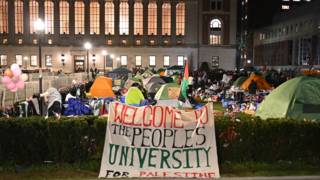
Related
Guests
- Roderick Harrisonformer chief of racial statistics at the Census Bureau, and sociology professor at Howard University. He’s also a senior fellow at the Joint Center for Political and Economic Studies.
A new study of U.S. census data reveals that wealth gaps between whites and minorities in the United States have grown to their widest levels since the U.S. government began tracking them a quarter-century ago. White Americans now have on average 20 times the net worth of African Americans and 18 times that of Latinos. According to the Pew Research Center, the gaps were compounded during the housing bust and the subsequent recession, and essentially wiped out much of the economic progress made by people of color over the past 20 years. We discuss the center’s study with Roderick Harrison, sociologist and demographer, and former chief of racial statistics at the Census Bureau. “Any hopes or aspirations, particularly based solely on Obama’s election, that we had reached some kind of post-racial state were close to delusional,” says Harrison. “This report is pointing to just how much the socioeconomic inequalities have been exacerbated by the recession and poor economy.” [includes rush transcript]
Transcript
JUAN GONZALEZ: A new analysis of U.S. Census data reveals a gaping wealth gap between whites and people of color. According to the Pew Research Center, the economic crisis has essentially wiped out much of the economic progress made by people of color over the past 20 years, resulting in “lopsided wealth ratios” that “are the largest since the government began publishing such data a quarter-century ago.”
Household wealth is the sum total of one’s assets, such as your house, car, savings and stocks, minus the sum of your debt, such as the mortgage on your house, your car loans or credit card debt. It is different from household income, which measures your annual wages and other earned income.
Wealth gaps between whites, African Americans and Hispanics have always been much greater than income gaps. But Paul Taylor of the Pew Research Center explains that the gaps were compounded during the housing bust and subsequent recession.
PAUL TAYLOR: Look at a before-and-after set of snapshots from 2005 to 2009. In 2005, the wealth gap ratios were roughly 10 to one. And they doubled to 20 to one. So they were already big, and they got even bigger. So, what happened? The main driver of these disparate impacts was the housing market. Blacks and Hispanics have fewer financial assets. Wealth—wealth is a combination of all your assets—your home, your car, your 401(k), your stocks, if you have them—minus all your debts—your mortgage, your car loan, your student loan, your credit card. The financial portfolio of blacks and Hispanics are much more dependent on their housing wealth than on anything else. They don’t have much else. So when the housing market tanked, as it started to in 2006, it disproportionately impacted blacks and Hispanics. On top of that, there was a regional impact. The housing market rose higher and fell more steeply in certain sections of the country.
JUAN GONZALEZ: That was Paul Taylor of the Pew Research Center. According to Pew’s new report, Latinos and African Americans have been particularly hard hit by the recession.
AMY GOODMAN: In 2009, white households had a median net worth of just over $113,000. In stark contrast, Latinos had $6,300, and African Americans had not quite $5,700. Between 2005 and 2009, whites lost 16 percent of their median net worth, but Latinos lost 66 percent, black households 53 percent, and Asians, who had topped white households in 2005, dropped 54 percent.
To discuss this growing wealth gap and what it means, we’re joined by Roderick Harrison of Howard University, sociologist, demographer and former chief of racial statistics at the Census Bureau.
Professor Harrison, welcome to Democracy Now! Talk about the significance of what we’re seeing. Between blacks and whites, we’re talking 20 to one in the wealth gap?
RODERICK HARRISON: It really takes us back to a period where—characterized by the Kerner Commission as two societies, separate and unequal. This is a chasm that just is striking. And the drops, the effects of the recession, the two-thirds loss in Hispanic wealth, the cutting black wealth in half, you usually don’t see cuts that dramatic. This is really suggesting just how hard the recession and the collapse of the housing market has hit these two minority populations.
JUAN GONZALEZ: Well, in terms—the importance of assessing the wealth gap versus the income gap, because obviously the income gap is a year-to-year situation, whereas the wealth gap is really sort of the accumulation of all the disparities of generations, really, whether it’s—you could be earning a lot of money as an African American, but if you have discriminatory lending rates or other matters, you’re still being penalized, subsequently. So, but here we have a situation where the Obama presidency was supposed to, for many people, bring in a post-racial America, where there was a greater sense of equality among the races, and yet we’re seeing this enormous step backward. Your sense of what it means for this concept of a post-racial America?
RODERICK HARRISON: It means that, clearly, any hopes or aspirations, particularly based solely on Obama’s election, that we had reached some kind of post-racial state were, you know, close to delusional. The socioeconomic realities have not changed on the ground. And this report is pointing to just how much the socioeconomic inequalities have been exacerbated by the recession and the poor economy. It has hit, as it historically does, lower-income minorities, less-educated populations, much more heavily than others. And this report has shown very graphically the consequences of this. So any—I think the sense that perhaps the willingness to elect the first black president does suggest some degree of importantry of moving beyond race in our society, but clearly, that has—doesn’t change the kind of socioeconomic realities that are the consequence of centuries and decades of inequality.
AMY GOODMAN: Professor Harrison, you were the chief of racial statistics at the Census Bureau. Can you talk about the trends, but also what shocked you most by this latest study?
RODERICK HARRISON: Well, the trends have been—you mentioned, in the previous question, the difference between income and wealth. We’ve been seeing now for decades increases in inequalities in income. And this is—there are many factors in that, including the incredibly—the incredible increases in the ratio of the incomes of executives and managers to workers within firms. But also, some of it is driven by the growth of the very good incomes of families with two college-educated workers and the stagnation of wages amongst males and a very slow growth amongst females and very slow growth amongst people with less than a college education. So, these things have contributed to the gap. And one would expect that since you do need to make sufficient income to be able to have savings that you can invest, whether it’s in savings accounts or stocks, bonds, etc., one would expect the increase in income inequality to gradually produce increases in wealth inequality, as well. But clearly, the recession has, just in a few short years, thrown us into a truly different world. The black and Hispanic income levels, you mentioned, wiped out 20 years of gains; they’re back to where they were in 1993, approximately. So—
JUAN GONZALEZ: I wanted to ask you about the specific impact of the housing crisis, especially in terms of the dramatic drop—as you say, two-thirds of wealth among Hispanic Americans. Much of the population growth of the Latino community was in states that experienced the greatest housing boom—Nevada, Arizona, Florida, California. And so, therefore, when the bust hit particularly hard in those states, it obviously must have had an enormous impact on the—on any kind of net worth that the Latinos in those states particularly—although it was true across the country, but those states were among the hardest hit in the subprime and in the general housing crisis.
RODERICK HARRISON: You’re exactly correct. These were very hot real estate markets, very rapid expansions of population and of housing values, and the states that are amongst the highest in foreclosure rates. And that really does account for the much higher loss in net worth, two-thirds loss in net worth in the Hispanic population, compared to the 50 percent loss in the black population and in the Asian population, which is also concentrated in states like California, and West Coast, that have been severely hit. The black losses and the Hispanic losses do reflect the higher concentration of subprime loans and of foreclosures in heavily black and Hispanic neighborhoods, as well. So we’re seeing really the devastating effects that the collapse of the housing markets and the very costs of it, the subprime loans, is now having. And these consequences will be with us for decades to come.
AMY GOODMAN: Roderick Harrison, maybe you could comment on how this fits into that issue of housing. The U.S. Department of of Justice is investigating allegations that Wells Fargo discriminated against African-American borrowers. The allegations assert the bank directed African-American borrowers to high-interest subprime mortgages even when they could afford regular mortgages. How does that play into this trend?
RODERICK HARRISON: It plays very heavily into this trend of—again, the housing collapse was triggered by, and has been most severe in, areas where subprime mortgages were most heavily concentrated. And it is true this is the most recent investigation, but over the past several years there have been others that do seem to indicate that not only Wells Fargo, but other major banks and mortgage brokers, in a sense, preyed on the black population, steering them into the subprime mortgages that were more profitable—higher interest rates, less favorable conditions—to the banks and to brokers, even amongst those who were qualified.
And then the market itself was trying to—was—the only place to grow for mortgage markets was into populations that had historically lower home ownership rates. The black and Hispanic home ownership rates is about 50 percent compared to 75 percent for whites. So, much of the past decade or two, the only growth market for banks in mortgages was into the minority and lower-income populations. So, we’re seeing now the effects of those discriminatory practices and the efforts to extend homeownership, perhaps laudable efforts at—looked laudable at the time, into segments of the population that—for whom it was a stretch.
JUAN GONZALEZ: I want to ask you to, if you can, to look into the future, in terms of where the situation is right now, because obviously there’s this continuing, persistent high unemployment throughout the country, but especially in the African-American and Latino communities, and increasingly, as local governments are reducing their workforces, trying to cut pension benefits, certainly for African Americans, and not so much perhaps for Latinos and for Asian Americans, government employment has been a huge conveyor belt for many African Americans to rise into the middle class, working in local and state governments and in the federal government. Your sense of what this portends for the future of the wealth gap, if these current trends continue?
RODERICK HARRISON: I think the prospects, at least for the next decade or two, are fairly grim. You’re quite correct. African Americans have higher percentages in the government sector than in the private sector, or relatively, compared to the general population. And these have been important avenues of opportunity that the recession is hitting heavily and that will cut into the employment and income of many workers, and many of them disproportionately black. These do have cumulating effects. Clearly, people who suffer job losses or have family members or relatives who do, often start drawing down on savings and on whatever assets they can convert to maintain their—to pay their bills and keep going until hopefully they can regain employment. This has, no doubt, contributed, a much smaller proportion than the housing problems, to some of the decline in the net worth of black and Hispanic families who have been—
AMY GOODMAN: What would be the most—what would be the single most effective way to reverse this trend, Roderick Harrison?
RODERICK HARRISON: It’s going to be very difficult. We’ve started out by noting that the major cause of this is the collapse in home values and home equity, which is the primary, and in many cases the sole, source of wealth for most families, and especially for black and Hispanic families. We’re seeing a very slow recovery in employment, so the unemployment problems, the underemployment, the discouraged worker percentages will continue to persist for some years to come. And the housing market shows very few signs of recovery, and one would think that it’s going to take five to 10 years, at least, before housing values recover. And the neighborhoods that were hit the hardest with foreclosures, and were lower housing values to begin with—black and Hispanic neighborhoods, lower-income neighborhoods—are almost certainly going to be the last to recover in the housing market. So you’ve had this massive drop, two-thirds, one-half drop in net worth, black, Hispanic, Asian populations. I don’t see this recovering for the next 10 years or so. I don’t see them—if they can recoup, if they can get back to the net worth levels that they were in 2005 within the next 10 years, I would be surprised.
AMY GOODMAN: Roderick Harrison—
RODERICK HARRISON: Now—mm-hmm?
AMY GOODMAN: We want to thank you very much for being with us. You just said “now,” so last point?
RODERICK HARRISON: People use net worth or draw on net worth to invest in their children’s education, to help with perhaps a first home, a down payment for a first home. We’re entering a period now where black and Hispanic families, one-third of whom have no net worth at all or negative net worth, won’t be able to help their children in this way. So this is going to definitely play into the next generation.
AMY GOODMAN: Roderick Harrison, associate professor of sociology at Howard University, former chief of racial statistics at the Census Bureau.












Media Options